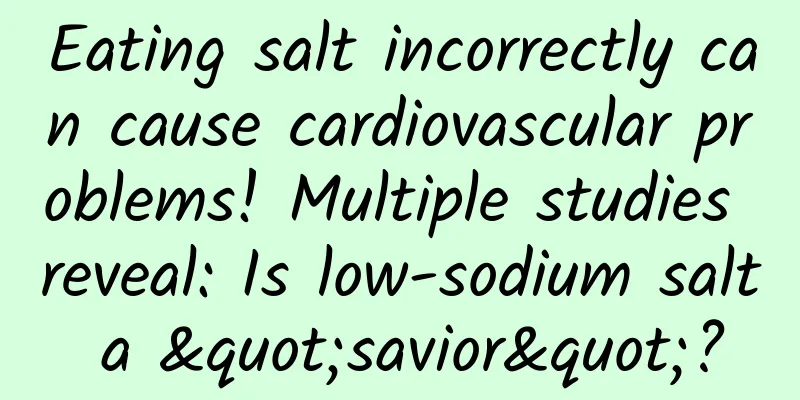I really advise you to eat less of these snacks!

|
In addition to three meals a day, snacks are indispensable in the daily lives of many people. Eat a bag of potato chips while watching TV, crack melon seeds while chatting, eat some plums when you are bored, and eat some biscuits when you are a little hungry or sleepy... It can be said to be a kind of "enjoyment" in life. Eating snacks can bring people a sense of happiness, but some snacks are not only easy to make you fat, but may also affect your health, so you should eat less of them. Eat less of these snacks 1. Words with the characters “派” and “酥” Typical representatives: apple pie, egg yolk pie, pineapple cake, mango cake, peanut cake... Foods with the word "pie" or "crispy" are always associated with various fruits, nuts, etc., which sound very healthy. However, if you take a closer look at the nutritional labeling, you can find that if you exclude the basic ingredients, many of the remaining raw materials may be additives. In addition, these foods are often added with "shortening" during processing, and shortening usually contains trans fat - hydrogenated vegetable oil. From a health perspective, consuming too much trans fatty acids will increase the risk of cardiovascular and cerebrovascular diseases and diabetes; for children, it will affect their intellectual development; for the elderly, it will accelerate cognitive decline and increase the risk of Alzheimer's disease. 2. With the word "crisp" Typical representatives: fruit and vegetable chips, crispy peanuts, instant noodles, crispy corners... In order to achieve a crispy texture, some foods need to add a large amount of leavening agents or be fried. Not only do they have little water content, but they also have a very high fat content. Eating them frequently may cause obesity and a series of cardiovascular and cerebrovascular diseases. What's more, some crispy snacks also contain salt and sugar. Eating them too much will affect the body's absorption of calcium and even aggravate calcium loss in the bones. 3. With the word "flavor" Typical representatives: mango-flavored mooncakes, vanilla-flavored biscuits, strawberry-flavored drinks... There are all kinds of seasonal fruit-flavored snacks in every season, such as mango, strawberry, etc. They do taste fruity, but some products may just have some flavors added, without any real fruit pulp. Taking fruit-flavored drinks as an example, most of them are made by adding flavors, sweeteners or food additives such as refined sugar to fruit juice and then diluting it with water. The real pure fruit juice is generally only about 10%. Some people also like to use these fruit-flavored drinks instead of daily drinking water. If they do this for a long time, excessive sugar intake will cause excess energy and increase the risk of obesity, tooth decay, diabetes and other diseases. These snacks should be eaten in moderation 1. Nuts Nuts are excellent nutritional "champions". They not only contain high-quality plant protein, but are also rich in dietary fiber and antioxidants. However, nuts have a high fat content and are a high-calorie food. Do not consume them in excess. If you accidentally eat too much, you should reduce the amount of oil and food you eat for your three meals a day. 2. Yogurt Yogurt can not only prevent hunger and supplement nutrition, but also prevent overeating at the next meal. As a snack, 100 grams (1 small cup) can be consumed at a time, and it is better to eat it with other fruits and nuts. Middle-aged and elderly people with high blood lipids can choose low-fat yogurt, and diabetics and obese people should choose sugar-free yogurt. 3. Candied Haws Hawthorn is rich in vitamins and minerals, especially lipase, which can promote the digestion of fatty foods, strengthen the stomach and help regulate blood lipids. The key is to control the amount, eat no more than one string at a time, and no more than twice a week. In addition to candied haws made from hawthorn, candied haws made from yam are also quite common. It is recommended that you eat them alternately, so that they are more nutritious. 4. Peanuts The protein content of peanuts can be as high as about 30%, and the nutritional value is comparable to animal foods such as eggs, milk, lean meat, etc., and it is easily absorbed and utilized by the human body. Peanut kernels contain 8 essential amino acids for the human body in a suitable proportion. They are also rich in polyunsaturated fatty acids, lecithin, B vitamins, vitamin E, and a variety of essential minerals and other elements. However, it is best not to eat infants and young children because peanuts can easily clog the trachea. Since peanuts contain a lot of oil, don't eat too much. Eat 50 grams to 100 grams (a small handful) of peanuts in the shell a day. |
>>: Remember the number "10"! Enjoy life and health in the bright spring sunshine
Recommend
Brown discharge underneath
Every girl has seen brown discharge. When menstru...
Pregnant woman with cold belly giving birth to a boy
Although most doctors will not tell pregnant wome...
Is postpartum urticaria temporary?
Urticaria occurs after giving birth. The symptoms...
How many years does menopause last?
Female friends will always go through the process...
Why do women sweat in the morning?
Morning is a very refreshing time, and the temper...
What are the things to pay attention to when having a second child?
Although having a second child has many benefits ...
A piece of five-nut mooncake makes Europeans and Americans "annihilate". Are Chinese people not prone to allergies?
“Chinese people are not prone to allergies?” Some...
What are the characteristics of Jiuzhaigou? How much is the ticket to Jiuzhaigou?
Jiuzhaigou is the first nature reserve in my coun...
Will my breasts get smaller after pregnancy?
The breasts will become bigger after pregnancy, m...
Why do women want to sleep when they feel tired and weak?
People often feel tired and weak, especially thos...
The more you eat, the more blood you bleed.
Duan Xue Liu is a blood-activating medicine commo...
How long does it take for menstruation to return to normal after spontaneous abortion?
Abortion is very harmful to women and may affect ...
How to strengthen the prevention and control of respiratory diseases in winter? Here comes the authoritative answer →
The National Health Commission held a press confe...
Treatment of bacterial vaginitis and candidal vaginitis
Many people often confuse vaginitis with candidal...
What are the characteristics of the female urethra?
The special structure of women's genitals can...









